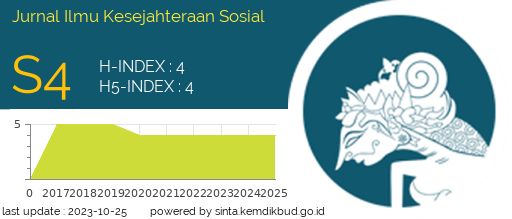DOI
10.7454/jurnalkessos.v16i1.1114
Abstract
The Facts about climate change and its impact on the ecosystem across the world has been taking greater attention from scholar, government, scientist, activist, as well as civil community. Based on IPCC report 2007, sea level rise and human development contributed to the lost of coastal wetland and mangroves as well as flooding in coastal areas. This research focused on describing the climate change impacts on children well-being in the society who strongly depend on natural resources, and what kind of the adaptation process and the changing occurred in child protection framework. The methods used include time line, tree problem, ranking activities, and season calendar of important events in both areas. These method were used to document the children development, the important events in which closely linked to changing climate, what kind adaptation they use when problems occurs, how the impacts to their children well being and the way they cope with it. Data showed that children forced to help their parents. The problem perceived in the society that closely linked to climate change and children well being such as food security because the unpredictable weather. They forced to looking for another alternative food supply from rice to cassava, reduce the rice consumption from 3 times a day become once in a day. Second, the impact of climate change exacerbated their economical condition. People forced to seek another job to fulfill their family’s needs. Third, due to their economic condition, it is difficult for them to get the access of education. The school fare was too high for them. The last problem is the lack of information on climate change and adaptation. The intervention from all level include government, NGOs, and civil society to strongly empower the adaptive capacity of indigenous people whose depend on natural resources to cope with climate change is required at least by providing the information.
Bahasa Abstract
Riset ini bertujuan untuk menggambarkan sistem perlindungan anak pada masyarakat adat yang hidupnya sangat tergantung dengan alam dan terdampak perubahan iklim. Tujuan lainnya adalah untuk menggambarkan proses adaptasi dalam menghadapi dampak-dampak dari perubahan iklim di dua propinsi yakni Palu, Sulawesi Tengah dan Sumba, Nusa Tenggara Timur. Penelitian ini menggunakan pendekatan kualitatif melalui metode Participatory Learning Action dengan teknik time line, problem tree, ranking activities, dan season calendar. Di dalam riset ini ditemukan bahwa masyarakat adat menghadapi problem terkait dengan perubahan iklim yang juga berpengaruh terhadap keberlangsungan hidup anak-anak mereka, seperti, masalah ketahanan pangan yang disebabkan oleh cuaca yang tidak menentu dan mengakibatkan gagal panen. Mereka mencari alternatif bahan makanan dan mengurangi frekuensi konsumsi nasi dari tiga kali sehari menjadi sehari sekali. Kedua, perubahan iklim juga semakin memperburuk keadaan ekonomi mereka sehingga terpaksa mencari alternatif pekerjaan lain untuk memenuhi kebutuhan keluarganya, anak ikut membantu orang tuanya dengan bekerja di pabrik. Ketiga, kondisi ekonomi tersebut menghambat usaha pemenuhan kebutuhan akan pendidikan anak-anak. Temuan lain yang terkait adalah kurangnya informasi mengenai perubahan iklim dan proses adaptasi terhadap perubahan iklim.
Recommended Citation
Cholid, Sofyan; Pranawati, Santy Yanuar; and Rahmawati, Restri
(2015)
"Perubahan Iklim dan Dampaknya Terhadap Sistem Perlindungan Anak Pada Masyarakat Tradisional Di Kupang (Nusa Tenggara Timur) dan Palu (Sulawesi Tengah),"
Jurnal Ilmu Kesejahteraan Sosial: Vol. 16:
No.
1, Article 6.
DOI: 10.7454/jurnalkessos.v16i1.1114
Available at:
https://scholarhub.ui.ac.id/jiks/vol16/iss1/6
Included in
Community-Based Learning Commons, Community-Based Research Commons, Community Health Commons, Counseling Commons, Disability Studies Commons, Family, Life Course, and Society Commons, Gerontology Commons, Inequality and Stratification Commons, Marriage and Family Therapy and Counseling Commons, Nonprofit Studies Commons, Organization Development Commons, Other Mental and Social Health Commons, Social Justice Commons, Social Policy Commons, Social Psychology and Interaction Commons, Social Welfare Commons, Social Work Commons, Substance Abuse and Addiction Commons




